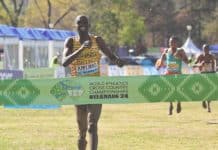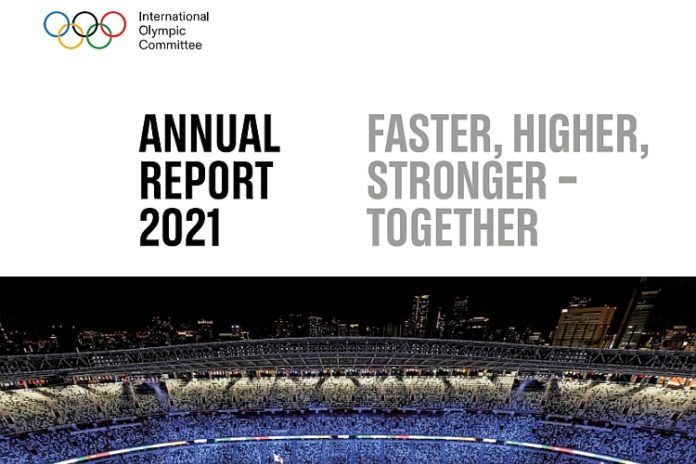● Plus: Cycling: UCI’s Russian ban implodes the Gazprom-RusVelo team, so what now? = Figure Skating: Multiple stars announce retirements at the end of the season = Ice Hockey: 2023 men’s Worlds appear ready to return to Finland = Skiing: FIS announces future Worlds hosts for Alpine, Freestyle & Snowboard, Nordic and Ski-Flying = Swimming: Story records abuse complaints against Cal Hall of Fame women’s coach McKeever = SCOREBOARD => Cycling: Carapaz holding on to the lead at
Giro d’Italia with four stages left ●
Key status updates on the urgent stories in Olympic sport:
≡ SPOTLIGHT ≡
The International Olympic Committee makes a big deal about giving 90% of its revenue to support the Olympic Movement and retaining only 10% for its own programs. From the IOC’s Annual Report for 2021:
“In 2021, the IOC recognised USD 4.2 billion in total revenue. Despite the complexities across the world brought about by the COVID-19 pandemic, the IOC has maintained the strength of value of its partnerships.
“The IOC retains 10% of Olympic revenue for IOC activities to develop sport and to cover the operational costs of governing the Olympic Movement. The rest is distributed to support the staging of the Olympic Games, promote the worldwide development of sport and the Olympic Movement, and assist with the implementation of Olympic Agenda 2020 and Olympic Agenda 2020+5.
“In the 2017–2020/2021 Olympiad, the IOC has supported the Olympic Movement with the equivalent of USD 4.2 million per day, 365 days a year, compared to USD 3.4 million per day in the previous Olympiad.”
Is this true?
Unfortunately, the IOC – to its detriment – does not include a specific schedule specifying how its 90% generosity is spread. So that leaves it to interested others – like TheSportsExaminer.com – to see for ourselves. So here goes; according to the financial statements at the back of the report:
Revenue:
The IOC’s “Consolidated Statement of Activities” for 2021 – including the Tokyo Olympic Games – showed:
● $3.107 billion: Television rights
● $836 million: TOP sponsorships
● $179 million: Other revenue (unilateral broadcasting revenue)
● $40 million: Other rights (royalties, suppliers)
The total was $4.162 billion, so 90% of that would be $3.746 billion, with $416 million left for the IOC’s 10% share.
Expenses:
The major expense for the IOC is the distribution of television and sponsorship revenues to the organizing committees of the Olympic Games, and to the International Federations and National Olympic Committees. The IOC has significant expenses for staging the Games, most especially the cost of the host broadcasting services:
● $2.060 billion: Payments to organizing committees/NOCs/IFs
● $741 million: Olympic Games costs, including host broadcasting
● $195 million: Promotion of the Movement (Olympic Channel)
● $93 million: Olympic Solidarity Program (for NOCs)
● $52 million: Grants (Anti-Doping, Court of Arbitration)
● $19 million: Special Projects
● $0.3 million: Youth Olympic Games support
All together, this comes to $3.1603 billion, or “just” 76% of the revenues for 2021. Aha!
So, the IOC are big liars, right, spending the rest on themselves?
No, that’s not right either. A 10% share of the IOC’s revenue for 2021 is $416 million and the operating expense for the organization itself was only $190 million in 2021, or 4.6%.
Blame it on the pandemic (oh yeah, sure …). At least in part. Even a glance at the IOC’s financials show that the postponement of the Tokyo Games by a year completely shattered the normal financial flow.
The IOC actually lost money in 2020, with $624 million in revenue and an operating loss of $175 million (net loss of just $55 million after some investment gains). That’s not supposed to happen. Combining the two years:
Revenue:
● 2021: $4.162 billion
● 2020: $624 million
● Total: $4.786 billion
Expenses:
● 2021: $3.160 billion not including IOC operations
● 2020: $625 million not including IOC operations
● Total: $3.785 billion or 79% of revenue
The 2020 costs for IOC operating expenses were $174 million, about 9% less than in 2021.
So where did the extra money go? The answer is into the IOC’s reserves, which were $3.36 billion at the end of 2021. With the Tokyo monies in hand and good investment performance in 2021, the IOC had a surplus of $844 million in 2021.
A very good year financially for the IOC, but a straightforward reading of its financial statements show that it distributed 79% of its revenues for 2020 and 2021 taken together to organizing committees, International Federations, National Olympic Committees and a host of other organizations.
And the IOC is exceedingly efficient with its own operations, spending just 7.6% of its revenue on internal operations: $364 million for the two years combined against $4.786 billion in total revenues. That’s considered excellent for non-profit organizations according to CharityNavigator.org.
But the IOC has money and it will be fascinating to see what Thomas Bach & Co. will do with the “excess” leftover funds between its promised 90% distribution and what its financials show as 79% for 2020 and 2021 combined.
≡ THE 5-RING CIRCUS ≡
● XXVI Olympic Winter Games: 2030 ● “We cannot and should not lose our position and prestige before the IOC, we want to organize the Games, we cannot give up on the Games in the Pyrenees.
“I will resume negotiations with all those who want to participate, and if we are not able to come to an agreement, we will see what we do.
“There is interest in the people of the Aragonese and Catalan Pyrenees and also the cities of Zaragoza and Barcelona. I am not going to stop fighting to get a candidacy.”
That was Spanish Olympic Committee President Alejandro Blanco, insisting that a 2030 Winter Games bid from Spain is not dead, despite the continued gridlock between the regional governments of Aragon and Catalonia over the distribution of the competition venues.
All of this is being magnified with the impending visit of IOC President Bach on 1 June to Madrid, which has Olympic aspirations of its own for an Olympic Games, perhaps in 2036 or 2040.
Blanco noted that the IOC’s three-member technical team which has visited and advised Salt Lake City and Vancouver and will visit Sapporo, has twice proposed visits to Spain, both of which were canceled amid the bickering.
“It is difficult to reach an agreement but not impossible.”
● Cycling ● A week after Russia invaded Ukraine, the Union Cycliste Internationale (UCI):
“withdrew UCI team status from all Russian and Belarusian teams. One of these teams was the UCI ProTeam (2nd division) Gazprom – RusVelo.
“Moreover, the UCI took a second measure directly affecting the team, that of declaring any sponsorship by Russian and Belarusian companies or brands as harmful to the image of cycling. Under article 1.1.089 of the UCI Regulations, any display of the sponsor Gazprom, as well as the name RusVelo, is therefore prohibited from all events on the UCI International Calendar until further notice.”
The inevitable result was that the Gazprom subsidiary which was the team sponsor withdrew its support, and the team’s Swiss-based management was unable to pay the riders. The UCI did inform the team management of conditions under which it could return to competitions, principally changing its affiliation to Switzerland and remove any connection to Russia.
What about the lost sponsorship money? Several of the team’s riders complained – “[t]he requests made to the UCI – whether from the team or the riders – could unfortunately not be considered as they required the UCI to bear the costs of the team” – and the federation noted that the Professional Cyclists Association (the riders union) has arrangements for all teams to allow payment of three months salary in the event of default.
And the team’s riders were freed from their contracts and able to sign with other squads.
The implosion of the former Gazprom-RusVelo team is an unintended consequence of the UCI’s actions against Russia, illustrating that even when doing the right thing, sometimes there are outcomes which no one wanted.
● Figure Skating ● With the end of the skating season come retirements and the International Skating Union noted some of the more prominent skaters who are moving on from competition, including (but not limited to):
● Michal Brezina (CZE: 32): Four-time Olympian in 2010-14-18-22 with a best of 10th in Vancouver and Sochi. He was the European bronze medalist in 2013 and appeared in 10 World Championships, finishing fourth in 2010 and 2011.
● Alexei Bychenko (ISR: 34): Born in the Ukraine, Bychenko represented Israel from 2010, winning the 2016 European Championships silver. He competed in three Olympic Games and nine Worlds, finishing as high as fourth in 2015.
● Sakoto Mihayara (JPN: 24): Two-time Worlds medalist, winning silver in 2015 and a bronze in 2018. She was fourth at the 2018 Winter Games in PyeongChang.
● Elizabet Tursynbaeva (KAZ: 22): Back injuries are forcing her retirement, after becoming the first Kazakh Worlds women’s medalist, a silver in 2019. She was 12th at the PyeongChang Games and competed in four Worlds.
American Olympian Alysa Liu and Ice Dance stars Madison Hubbell and Zachary Donohue both previously announced their retirements at the end of the season. Liu, still just 16, won two national titles and was seventh at the Beijing Winter Games. Hubbell and Donohue won the Olympic bronze in Beijing and Worlds silvers in 2018-21-22 and a Worlds bronze in 2019.
U.S. Pairs skater Brian Johnson, who had performed with Jessica Calalang since 2018, has also decided to retire from competition.
● Ice Hockey ● While the IIHF men’s World Championship is ongoing in Finland, the 2023 Worlds are yet to be sited, but a return to Finland looks sure.
A bid from Finland and Latvia to co-host the event is the only one left standing, after Hungary and Slovenia withdrew their bid. The event was originally slated for St. Petersburg (RUS), but was removed by the IIHF Council in April.
The proposal is for matches in Tampere – also where this year’s games are being held – and in Riga (LAT). Per the announcement:
“The Hungarian Ice Hockey Federation informed the IIHF that it did not receive the governmental guarantees to host the 2023 IIHF Ice Hockey World Championship and therefore withdrew the bid.”
The 2024 Championships were awarded to the Czech Republic and in 2025 to a joint bid from Denmark and Sweden.
● Skiing ● The FIS Council awarded multiple World Championships on Wednesday; in order:
2026:
= FIS Ski-Flying World Championships: Obertsdorf (GER)
2027:
= FIS Alpine Skiing World Championships: Crans-Montana (SUI)
= FIS Nordic Skiing World Championships: Falun (SWE)
= FIS Freestyle & Snowboard World Championships: Montafon (AUT)
All votes were unanimous except the Alpine Worlds, where Crans-Montana received 11 votes to win over Narvik (NOR: 3 votes), Soldeu (AUT: 3) and Garmisch-Partenkirchen (GER: 1).
This will be the seventh Ski-Flying Worlds for Obertsdorf and the second Nordic Worlds for Falun (also in 2015) and for Montaton for the Freestyle & Snowboard Worlds (also in 2015).
Crans-Montana hosted the 1987 Alpine Worlds and 2027 will mark the 10th time that this event has been held in Switzerland, and the first since 2003.
● Swimming ● The University of California is one of America’s pre-eminent public universities and its women’s swimming program has won four NCAA team titles under coach Teri McKeever in 2009-11-12-15. A member of the American Swimming Coaches Association Hall of Fame, McKeever is in her 30th season as head coach of the Cal women’s swimmer and was the U.S. Olympic women’s coach for the 2012 London Games.
That program is now is disarray after an explosive story by Scott Reid on Tuesday for the Orange County Register, headlined:
“Cal swimmers allege coach Teri McKeever bullied and verbally abused them for years
“Swimmers describe a toxic culture that led to a number of mental health issues and an unresponsive administration”
The story details how at least six swimmers contemplated suicide since 2018, with Reid writing:
“[I]n interviews with [the Southern California News Group], 19 current and former Cal swimmers, six parents, and a former member of the Golden Bears men’s team portray McKeever as a bully who for decades has allegedly verbally and emotionally abused, swore at and threatened swimmers on an almost daily basis, pressured athletes to compete or train while injured or dealing with chronic illnesses or eating disorders, even accusing some women of lying about their conditions despite being provided medical records by them.”
Cal finished fourth at the just-completed NCAA Women’s Swimming & Diving Championships; the university issued a statement in response to the story that included:
“The allegations described are serious and deeply disturbing in that they describe behavior antithetical to our values and policies. We are now, as always, encouraging current and former students to report behaviors and incidents that run counter to our policies and our values. We are now, as always, encouraging current and former students who may have been impacted to seek out support and assistance.”
Reid reported Wednesday that swimmers who came to morning practice were told a meeting would be held, but no team meeting was held. Instead, the swimmers met briefly with McKeever and then left. Swimmers were to meet with Cal athletics officials later that day; Reid’s story explained that “The university’s Office for the Prevention of Harassment and Discrimination has opened a formal investigation into the incident.”
≡ SCOREBOARD ≡
● Cycling ● The 105th Giro d’Italia is heading to the finish this weekend, with Ecuador’s Richard Carapaz holding on to the Maglia Rosa after the 17th stage was completed on Wednesday.
This was another climbing stage, with three major ascents, including 1,378 m Valico del Vetriolo and 1,262 m Monterovere in the final third of the 168 km that finished in Lavarone. It was Colombia’s Santiago Buitrago who attached hard on the Monterovere and soloed to the win over the final 8 km.
Gijs Leemreize (NED) was closest, 35 seconds back and then it was 2:28 to Jan Hirt (CZE) and Hugh Carthy (GBR) in third and fourth.
Carapaz was fifth, 2:53 back, with primary challenger Jai Hindley (AUS) right behind. That means Carapaz has a three-second lead with four stages to go, including Sunday’s finale, an Individual Time Trial in Verona. Spain’s Mikel Landa is now third, 1:05 back as Portugal’s Joao Almeida fell back to fourth (+1:54).
You can receive our exclusive TSX Report by e-mail by clicking here. You can also refer a friend by clicking here, and can donate here to keep this site going.
For our updated, 620-event International Sports Calendar for 2022 and beyond, by date and by sport, click here!




















